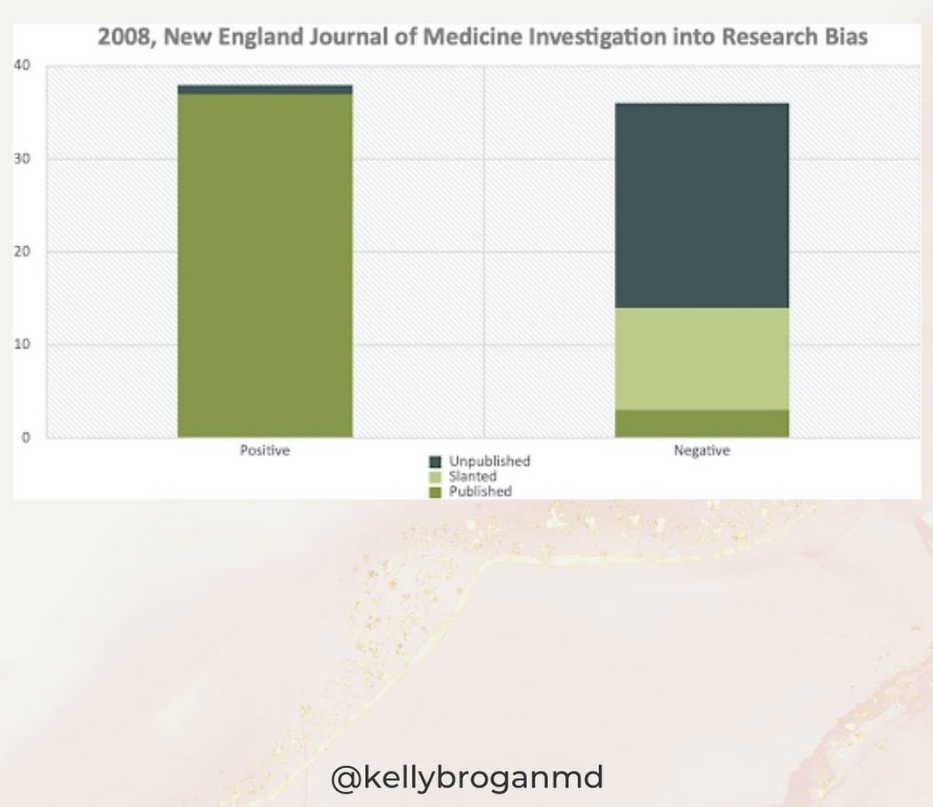
“There is no valid evidence for the chemical imbalance theory of any mental illness.” Dr Kelly Brogan
WARNING. If you are currently taking any psychiatric medication withdrawal can be tricky and should be tapered gradually with careful clinical supervision and a support network. Peter Breggin addresses this topic extensively.[1]
Joanna Moncrieff recently published an umbrella review of tens of thousands of subjects that failed to demonstrate that serotonin has anything to do with mood.[2]
On top of that industry, plays a dirty game…They can hide and manipulate data to gain approval for drugs.
Check out this:

Almost every single one of the positive studies are published. Only a fraction of the negative studies are published. The majority of negative studies are hidden, others are skewed as positive.
This is one of the many ways that we are led to believe – especially through direct to consumer advertising of prescription meds (DTC advertising is only permitted in 2 countries in the world) – that these medications actually work. Guess which country has the highest consumption of prescription drugs?
In 2006 a very important review was published called “Do Antidepressants Cure or Create Abnormal Brain States?” The findings? “No evidence shows that antidepressants or any other drugs produce long-term elevation of mood or other effects that are particularly useful in treating depression.” [3]
AKA: There is no valid evidence for the chemical imbalance theory of any so-called mental illness.
Can you release anxiety and reclaim your health without the meds?
“It is a basic principle of pharmacotherapy that all drugs have beneficial and harmful effects.”[4]
“Unfortunately, in the balance between benefits and risks, it is an uncomfortable truth that most drugs do not work in most patients.”[4]
There has never been a human study that successfully links low serotonin levels and depression.
Joanna Moncrieff just came out with a very important review, summarizing a lot of this data, looking at: more analysis, cerebrospinal fluid, blood analysis, genetic markers.[2]
The findings?
There is no valid evidence for the chemical imbalance theory of any so-called mental illness. So if your brain sin’t broken, then what’s the problem?
Get to the root cause, and change your story, in a matter of weeks. Oh, and exercise could be one of the best treatments for depression, anxiety and distress. [5]
Becky Hastings collects information on health and tries her best to discover and share truth. By God’s grace, through Jesus Christ, I was saved, blessed with a husband of over 40 years, and five precious babies all grown up. I now get to delight as ten grandchildren grow! Together we can help each other discover a healthy path in this crazy upside down world.
1. Are all psychiatric drugs too unsafe to take? “Whenever possible, psychiatric drugs should be tapered and withdrawn either as an inpatient or as an outpatient with careful clinical supervision and a support network as described in Psychiatric Drug Withdrawal. Keep in mind that it is not only dangerous to take psychiatric drugs — it can be dangerous to withdraw from them. The safest solution is to avoid starting psychiatric drugs! It is time for a return to psychological, social and educational approaches to emotional suffering and impairment.” https://psych.breggin.com/are-all-psychiatric-drugs-too-unsafe-to-take/
2. The serotonin theory of depression: a systematic umbrella review of the evidence.: Moncrieff J, Cooper RE, Stockmann T, Amendola S, Hengartner MP, Horowitz MA. The serotonin theory of depression: a systematic umbrella review of the evidence. Mol Psychiatry. 2022 Jul 20. doi: 10.1038/s41380-022-01661-0. Epub ahead of print. PMID: 35854107. https://pubmed.ncbi.nlm.nih.gov/35854107/
3. Do Antidepressants Cure or Create Abnormal Brain States?
Moncrieff J, Cohen D (2006) Do Antidepressants Cure or Create Abnormal Brain States?. PLOS Medicine 3(7): e240. https://doi.org/10.1371/journal.pmed.0030240
4. Balancing Benefits and Harms. Godlee F. Balancing benefits and harms BMJ 2013; 346 :f3666 doi:10.1136/bmj.f3666 https://www.bmj.com/content/346/bmj.f3666
5. Effectiveness of physical activity interventions for improving depression, anxiety and distress: an overview of systematic reviews. Singh B, Olds T, Curtis R, et al. Effectiveness of physical activity interventions for improving depression, anxiety and distress: an overview of systematic reviews. British Journal of Sports Medicine Published Online First: 16 February 2023. doi: 10.1136/bjsports-2022-106195 https://bjsm.bmj.com/content/early/2023/03/02/bjsports-2022-106195

